初二英语语法学习归纳
初二英语知识点归纳
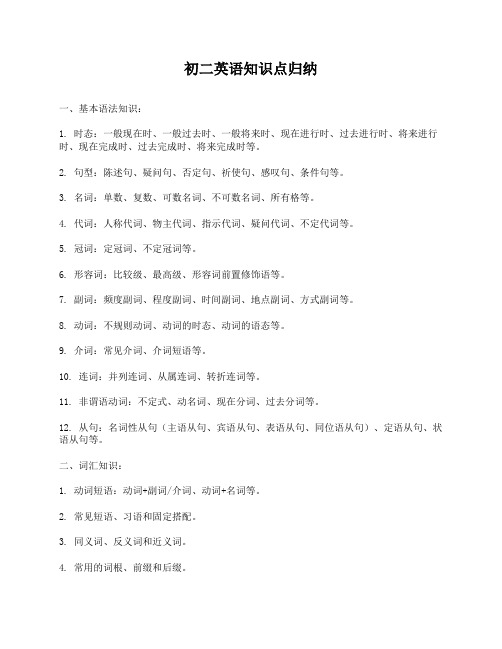
初二英语知识点归纳一、基本语法知识:1. 时态:一般现在时、一般过去时、一般将来时、现在进行时、过去进行时、将来进行时、现在完成时、过去完成时、将来完成时等。
2. 句型:陈述句、疑问句、否定句、祈使句、感叹句、条件句等。
3. 名词:单数、复数、可数名词、不可数名词、所有格等。
4. 代词:人称代词、物主代词、指示代词、疑问代词、不定代词等。
5. 冠词:定冠词、不定冠词等。
6. 形容词:比较级、最高级、形容词前置修饰语等。
7. 副词:频度副词、程度副词、时间副词、地点副词、方式副词等。
8. 动词:不规则动词、动词的时态、动词的语态等。
9. 介词:常见介词、介词短语等。
10. 连词:并列连词、从属连词、转折连词等。
11. 非谓语动词:不定式、动名词、现在分词、过去分词等。
12. 从句:名词性从句(主语从句、宾语从句、表语从句、同位语从句)、定语从句、状语从句等。
二、词汇知识:1. 动词短语:动词+副词/介词、动词+名词等。
2. 常见短语、习语和固定搭配。
3. 同义词、反义词和近义词。
4. 常用的词根、前缀和后缀。
5. 一些常见的词汇拼写规则和变形规则。
6. 数字、日期、星期、时间、颜色、动物、食物、家庭成员、学科、国家和城市等。
三、阅读理解:1. 根据文章内容回答问题。
2. 根据文章中的信息进行推测、判断或总结。
3. 理解文章的主旨、目的、态度、观点等。
4. 根据文章的语境理解词义。
5. 了解不同类型的文体特征和写作方式。
四、写作能力:1. 书面表达:写信、写日记、写作文等。
2. 口头表达:简单介绍、自我介绍、描述事物等。
3. 语法运用:正确使用时态、人称、冠词、代词等。
4. 语言表达:丰富的词汇、恰当的句型、流畅的语言。
五、听力技能:1. 听懂并获取关键信息。
2. 根据对话或短文回答问题。
3. 听懂人物之间的对话和交流。
4. 培养对英语语音和语调的感觉。
六、口语交流:1. 学会问问题和回答问题。
2. 学会用英语进行简单的交流和沟通。
初二英语语法知识点总结归纳
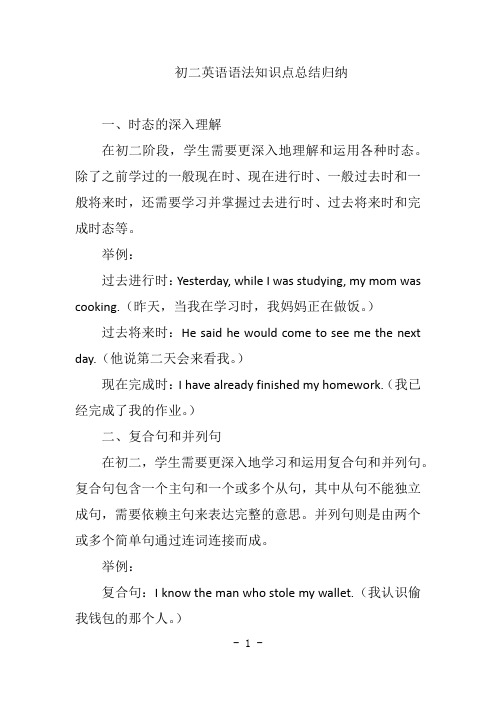
初二英语语法知识点总结归纳一、时态的深入理解在初二阶段,学生需要更深入地理解和运用各种时态。
除了之前学过的一般现在时、现在进行时、一般过去时和一般将来时,还需要学习并掌握过去进行时、过去将来时和完成时态等。
举例:过去进行时:Yesterday, while I was studying, my mom was cooking.(昨天,当我在学习时,我妈妈正在做饭。
)过去将来时:He said he would come to see me the next day.(他说第二天会来看我。
)现在完成时:I have already finished my homework.(我已经完成了我的作业。
)二、复合句和并列句在初二,学生需要更深入地学习和运用复合句和并列句。
复合句包含一个主句和一个或多个从句,其中从句不能独立成句,需要依赖主句来表达完整的意思。
并列句则是由两个或多个简单句通过连词连接而成。
举例:复合句:I know the man who stole my wallet.(我认识偷我钱包的那个人。
)并列句:She is smart, and she is also very hardworking.(她很聪明,而且也非常努力。
)三、直接引语和间接引语的进一步运用在初二,学生需要更深入地理解和运用直接引语和间接引语,包括引语中的时态、人称和语序等变化。
举例:时态变化:He said, "I was born in 1990." →He said he was born in 1990.(他说:“我1990年出生。
”→他说他1990年出生。
)人称变化:She said to me, "I like your book." →She said to me that she liked my book.(她对我说:“我喜欢你的书。
”→她对我说她喜欢我的书。
)四、情态动词和助动词在初二阶段,学生需要学习和掌握情态动词(如can, may, must等)和助动词(如do, does, did等)的用法。
八年级英语语法知识点归纳总结
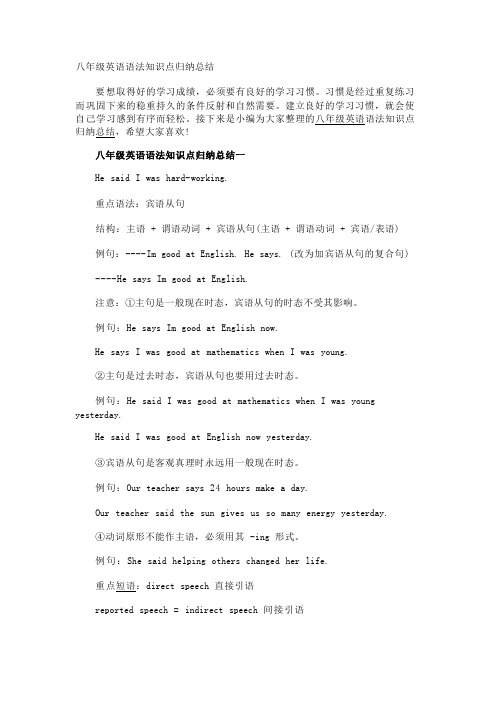
八年级英语语法知识点归纳总结要想取得好的学习成绩,必须要有良好的学习习惯。
习惯是经过重复练习而巩固下来的稳重持久的条件反射和自然需要。
建立良好的学习习惯,就会使自己学习感到有序而轻松。
接下来是小编为大家整理的八年级英语语法知识点归纳总结,希望大家喜欢!He said I was hard-working.重点语法:宾语从句结构:主语 + 谓语动词 + 宾语从句(主语 + 谓语动词 + 宾语/表语) 例句:----Im good at English. He says. (改为加宾语从句的复合句) ----He says Im good at English.注意:①主句是一般现在时态,宾语从句的时态不受其影响。
例句:He says Im good at English now.He says I was good at mathematics when I was young.②主句是过去时态,宾语从句也要用过去时态。
例句:He said I was good at mathematics when I was young yesterday.He said I was good at English now yesterday.③宾语从句是客观真理时永远用一般现在时态。
例句:Our teacher says 24 hours make a day.Our teacher said the sun gives us so many energy yesterday.④动词原形不能作主语,必须用其 -ing 形式。
例句:She said helping others changed her life.重点短语:direct speech 直接引语reported speech = indirect speech 间接引语first of all = at first 首先pass on 传递be supposed to do sth. 应该做某事be good at = do well in 在某方面做得好in good health 身体健康get over 克服open up 打开care for = take care of = look after 照料;照顾not any more = not any longer = no longer 不再have a cold 感冒end-of-year exam 年终考试get nervous 变得紧张forget to do sth. 忘记做某事(该事未做)forget doing sth. 忘记做某事(该事已做)its + adj. + [for sb.] + to do sth. 做某事[对某人来说](加形容词)context 上下文Reading Strategy(阅读方法)First read for meaning, not for detail. (首先理解文段的大致意思,不在于文段的细节部分。
初二英语语法大全
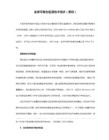
2010天津学而思暑秋两季招生简章
热门新闻
小升初英语口语练习必备话题 运动、食物、
小升初英语口语练习必备话题 姓名、年龄等
小升初英语与体育音乐美术结合孩子易接受
英语学习方法浅谈:“读写”以致用
2010年天津外国语大学附属外国语学校小升初
be going to do (动词原形)结构:表示打算、准备做的事情或者肯定要发生的事情。如:It is going to rain.
will do 结构表示将来的用法:
1. 表示预见
Do you think it will rain?
You will feel better after a good rest.
特殊疑问句构成:
特殊疑问词+will+主语+…?What will Sarah do next Sunday?
根据例句,用will改写下列各句
例:I don't feel well today. (be better tomorrow)
I'll be better tomorrow.
2010年学而思暑秋六年级英语剩余名额查询
2010年学而思暑秋五年级英语剩余名额查询
2010年学而思暑秋四年级英语剩余名额查询
2010年学而思暑秋三年级英语剩余名额查询
400-810-2680智康VIP | 一对一个性化辅导在线课程咨询英语一对一名师团队介绍 精品教研:中考英语知识点 智康高考英语冲刺精品课程
2010年天津外国语大学附属外国语学校小升初
小外小卷录取考生名单及注册重要通知
2010年天津外国语大学附属外国语学校小升初
初二英语全部知识点归纳

初二英语全部知识点归纳一、词汇和语法知识点1. 时态:一般现在时、一般过去时、一般将来时、现在进行时、过去进行时、过去完成时等。
2. 介词:表示位置关系(in, on, at);表示时间关系(at, on, in, before, after)等。
3. 冠词:不定冠词(a, an)、定冠词(the)等。
4. 数词:基数词和序数词的用法。
5. 名词:可数名词和不可数名词的区别及用法;名词所有格的构成等。
6. 代词:人称代词、物主代词、指示代词、不定代词等。
7. 形容词:形容词的基本用法及比较级、最高级的构成等。
8. 副词:副词的基本用法及比较级、最高级的构成等。
9. 动词:动词的变化规则、情态动词的用法等。
10. 句型:陈述句、疑问句、祈使句、感叹句、条件句等。
11. 从句:定语从句、宾语从句、表语从句、状语从句等。
二、阅读理解知识点1. 阅读技巧:理解主题、根据上下文猜测词义、抓住关键信息等。
2. 主旨大意:根据文章的首句和尾句,了解文章的中心思想。
3. 推理判断:通过文章中的细节推断,对文中的事实进行判断。
4. 细节理解:理解文章细节,包括信息的明示和暗示、细节的排序和归类等。
5. 逻辑推理:根据文章中的信息,分析作者的观点和态度。
6. 指代理解:理解文章中代词、指示词的指代关系。
7. 文章结构:了解文章各部分之间的逻辑关系,如因果关系、转折关系等。
三、写作知识点1. 作文结构:开头(引入话题、提出主题)、主体(论证观点、给出例子、做出解释)、结尾(总结观点、给出建议)。
2. 写作技巧:使用恰当的连接词、使用合理的句子结构、选择恰当的词汇表达等。
3. 句式变换:改变句子的主动语态、被动语态、复合句的变换等。
4. 书信写作:了解书信的格式和写作要求,包括称呼、结尾、语气等。
5. 日记写作:写作日记时候应注意语言简洁明了,情感真实,时态正确等。
四、听力知识点1. 听懂对话和短文:理解对话中的信息和短文的主旨。
初二 英语语法基础知识大全
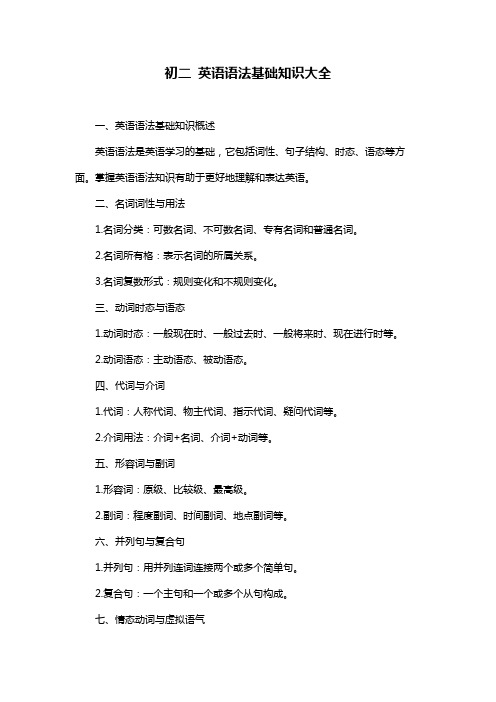
初二英语语法基础知识大全一、英语语法基础知识概述英语语法是英语学习的基础,它包括词性、句子结构、时态、语态等方面。
掌握英语语法知识有助于更好地理解和表达英语。
二、名词词性与用法1.名词分类:可数名词、不可数名词、专有名词和普通名词。
2.名词所有格:表示名词的所属关系。
3.名词复数形式:规则变化和不规则变化。
三、动词时态与语态1.动词时态:一般现在时、一般过去时、一般将来时、现在进行时等。
2.动词语态:主动语态、被动语态。
四、代词与介词1.代词:人称代词、物主代词、指示代词、疑问代词等。
2.介词用法:介词+名词、介词+动词等。
五、形容词与副词1.形容词:原级、比较级、最高级。
2.副词:程度副词、时间副词、地点副词等。
六、并列句与复合句1.并列句:用并列连词连接两个或多个简单句。
2.复合句:一个主句和一个或多个从句构成。
七、情态动词与虚拟语气1.情态动词:可能性、必要性、推测等。
2.虚拟语气:与现实相反的句子表达。
八、疑问句与否定句1.疑问句:一般疑问句、特殊疑问句、选择疑问句等。
2.否定句:在句子中加入否定词或用部分倒装。
九、直接引语与间接引语1.直接引语:直接跟在动词后面的宾语。
2.间接引语:通过连词或介词引导的宾语。
十、汉语与英语语法差异1.语序差异:汉语主谓宾,英语主谓宾。
2.词性差异:汉语词性较少,英语词性丰富。
3.动词变化差异:汉语动词无变化,英语动词有时态、语态变化。
通过掌握以上英语语法基础知识,同学们可以更好地应对英语学习中的各种问题。
初二英语语法重点归纳
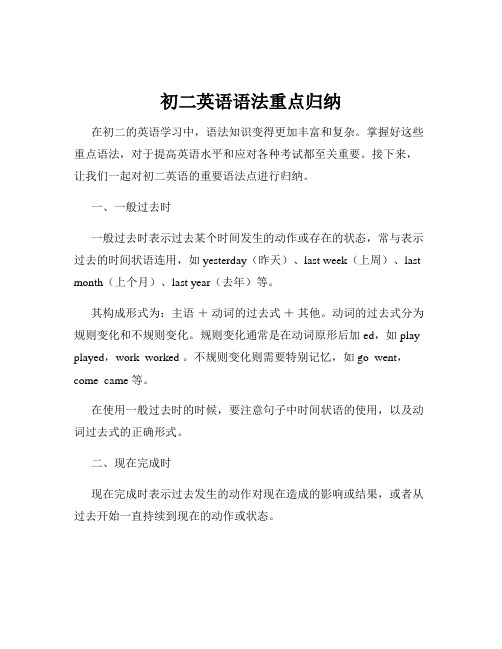
初二英语语法重点归纳在初二的英语学习中,语法知识变得更加丰富和复杂。
掌握好这些重点语法,对于提高英语水平和应对各种考试都至关重要。
接下来,让我们一起对初二英语的重要语法点进行归纳。
一、一般过去时一般过去时表示过去某个时间发生的动作或存在的状态,常与表示过去的时间状语连用,如 yesterday(昨天)、last week(上周)、last month(上个月)、last year(去年)等。
其构成形式为:主语+动词的过去式+其他。
动词的过去式分为规则变化和不规则变化。
规则变化通常是在动词原形后加 ed,如 play played,work worked 。
不规则变化则需要特别记忆,如 go went,come came 等。
在使用一般过去时的时候,要注意句子中时间状语的使用,以及动词过去式的正确形式。
二、现在完成时现在完成时表示过去发生的动作对现在造成的影响或结果,或者从过去开始一直持续到现在的动作或状态。
构成形式为:主语+ have/has +过去分词。
现在完成时常与already(已经)、yet(还,尚未)、ever(曾经)、never(从不)、for +时间段、since +时间点等连用。
例如:I have already finished my homework(我已经完成了我的作业。
) He has lived here since 2010(他自 2010 年以来就住在这里。
)要注意区分一般过去时和现在完成时的用法,一般过去时强调过去的动作,与现在没有关系;而现在完成时强调过去的动作对现在的影响或与现在的联系。
三、过去进行时过去进行时表示过去某个时刻或时间段正在进行的动作。
其构成形式为:主语+ was/were +现在分词。
常与 at that time (在那时)、at this time yesterday(昨天这个时候)等时间状语连用。
例如:I was reading a book at eight o'clock last night(昨晚八点我正在读书。
初二英语重点知识归纳

初二英语重点知识归纳初二英语作为初中英语学习的重要阶段,不仅巩固了初一的基础,还为初三的英语学习打下了坚实的基础。
在这个阶段,学生们需要掌握一些重点知识,包括语法、词汇、句型和阅读理解等。
以下是初二英语的重点知识归纳:1. 词汇积累:词汇是英语学习的基础,初二学生应该掌握更多的词汇,包括日常生活、学校生活、文化习俗等方面的词汇。
此外,学生还应该学会如何通过词根、词缀等方法来记忆和理解新词汇。
2. 语法知识:初二英语的语法知识包括但不限于时态、语态、非谓语动词、从句等。
学生需要理解并熟练运用各种时态,如一般现在时、一般过去时、一般将来时等,以及它们的被动语态形式。
同时,掌握非谓语动词的用法,如动名词、分词和不定式,以及它们在句子中的作用。
3. 句型结构:掌握各种基本句型,如主谓宾结构、主系表结构、主谓结构等,是提高英语表达能力的关键。
学生应该能够灵活运用这些句型来构建复杂的句子,表达更丰富的内容。
4. 阅读理解:提高阅读理解能力是初二英语学习的重要目标。
学生应该通过阅读各种类型的文本,如故事、说明文、议论文等,来提高自己的阅读速度和理解能力。
同时,学会运用上下文线索、词汇推断等技巧来理解文章的深层含义。
5. 写作技巧:初二学生应该开始练习写作,包括记叙文、说明文和议论文等。
在写作过程中,学生需要学会如何组织文章结构,使用恰当的连接词,以及如何表达自己的观点和看法。
6. 听力训练:听力是英语学习的重要组成部分。
学生应该通过听英语歌曲、看英语电影、听英语广播等方式来提高自己的听力水平。
同时,也可以通过做听力练习题来检验自己的听力理解能力。
7. 口语表达:口语能力的提高需要大量的实践。
学生应该抓住每一个机会来练习口语,如参加英语角、和同学进行英语对话等。
在口语表达中,注意语音、语调和流利度,以及如何组织语言来表达自己的想法。
8. 学习策略:掌握有效的学习策略对于提高英语学习效率至关重要。
学生应该学会如何制定学习计划,如何进行自我评估和自我调整,以及如何利用各种资源来辅助学习。
- 1、下载文档前请自行甄别文档内容的完整性,平台不提供额外的编辑、内容补充、找答案等附加服务。
- 2、"仅部分预览"的文档,不可在线预览部分如存在完整性等问题,可反馈申请退款(可完整预览的文档不适用该条件!)。
- 3、如文档侵犯您的权益,请联系客服反馈,我们会尽快为您处理(人工客服工作时间:9:00-18:30)。
初二英语语法大全一. 知识点:一般将来时一般将来时表示将来某个时间要发生的动作或者存在的状态。
通常与表示将来的时间状语连用,如tomorrow, the day after tomorrow, next year, next month, next week, in 100 years等。
be going to do (动词原形)结构:表示打算、准备做的事情或者肯定要发生的事情。
如:It is going to rain.will do 结构表示将来的用法:1. 表示预见Do you think it will rain?You will feel better after a good rest.2. 表示意图I will borrow a book from our school library tomorrow.What will she do tomorrow?基本构成如下:一般疑问句构成:(1)will+主语+do…? Will Sarah come to visit me next Sunday?(2)there be 结构的一般疑问句:Will there + be …?Will there be fewer trees? Yes, there will. / No, there won’t否定句构成:will + not (won’t)+doSarah won’t come to visit me next Sunday.特殊疑问句构成:特殊疑问词+will+主语+…?What will Sarah do next Sunday?根据例句,用will改写下列各句例:I don’t feel well today. (be better tomorrow)I’ll be better tomorrow.1. Gina has six classes today. (have a lot of homework tonight)_____________________________2. I’m tired now. (sleep later)_____________________________3. My parents need a new car. (buy one soon)_____________________________4. We can’t leave right now. (leave a little later)_____________________________5. The weather is awful today. (be better tomorrow)_____________________________答案:1. She’ll have a lot of homework tonight.2. I’ll sleep later.3. They’ll buy one soon.4. We’ll leave a little later.5. Maybe it’ll be better tomorrow.(二)should的用法:should用来提出建议和忠告,后边加动词原形,否定句直接在should后边加not.例如:I think you should eat less junk food.我认为你应该少吃垃圾食品。
She drives a lot and she seldom walks. So I think she should walk a lot.她经常开车,很少走路。
所以我认为她应该多走路。
Students shouldn’t spend too much time playing computer games.学生们不应当花太多的时间玩计算机游戏。
学习向别人提建议的几种句式:(1)I think you should…(2)Well, you could…(3)Maybe you should …(4)Why don’t you…?(5)What about doing sth.?(6)You’d better do sth.用should或shouldn’t填空1. I can’t sleep the night before exams.You ______ take a warm shower before you go to bed.2. Good friends ______ argue each other.3. There is little milk in the glass. We _______ buy some.4. They didn’t invite you? Maybe you ______ be friendlier.5. I am a little bit overweight. So I think I _______ do exercises every day.答案:1. should 2. shouldn’t 3. should 4. should 5. should(三)过去进行时过去进行时表示过去某一点时间正在进行的动作或者过去某一段时间内一直进行的动作。
1. 构成was /were + doing,例如:I was watching TV at 9 o’clock last night.at 9 o’clock last night是时间点They were playing football all afternoon.all afternoon是时间段2. 过去进行时的标志词at 8 o’clock last night, this time yesterday等。
例如:I was having lunch at home this time yesterday.昨天的这个时候我正在吃午饭。
At that time she was writing a book.那阵子她在写一本书。
(表示她在那段时间里一直在做那件事情。
)用括号中所给动词的适当形式填空。
1. This time yesterday I ____ ______(read)books.2. At 9 o’clock last Sunday they ______ ______(have)a party.3. When I _____(come)into the classroom, she ________ ______(read)a storybook.4. She _____ ______(play)computer games while her mother ____ ______(cook)yesterday afternoon.5. I _____ ______(have)a shower when you _______(call)me yesterday.答案:1. was reading 2. were having 3. came; was reading4. was playing; was cooking5. was having; called(四)间接引语形成步骤:(1)不要逗号,冒号,引号(2)要考虑到人称的变化(人称的变化与汉语是一致的)(3)要考虑时态的变化(4)要考虑时间状语、地点状语和语示代词的变化。
1. 直接引语变成间接引语时,几个主要时态的变化规律直接引语间接引语一般现在时一般过去时一般将来时过去将来时现在进行时过去进行时2. 直接引语变成间接引语时,一些词汇的变化规律直接引语1. am / is2. are3. have / has4. will5. can6. may间接引语1. was2. were3. had4. would5. could6. might用括号中所给动词的适当形式填空。
1. She said I _____(be)hard-working.2. Peter told me he _____(be)bored yesterday.3. She said she _____(go)swimming last Sunday.4. Bobby said he _____(may)call me later.5. Antonio told me he _____(read)a book then.答案:1. was 2. was 3. went 4. might 5. was reading请转述他人说的话:1. I go to the beach every Saturday. (Tom)2. I can speak three languages. (Lucy)3. I will call you tomorrow. (Mike)4. I’m having a surprise party for Lana. (she)(五)if引导的条件状语从句结构:if+一般现在时,主语+将来时含义:如果……,将要……例如:If you ask him, he will help you.如果你请求他,他会帮助你。
If need be, we’ll work all night.如果需要,我们就干个通宵。
根据中文提示,完成句子。
1. 如果你参加聚会,你将会过得很开心。
If you ________ the party, you __________.2. 如果明天下雨,我们将不去野餐。
If it __________ tomorrow, we ___________.3. 如果你经常听英文歌,你将会喜欢英语的。
If you often ________, you _________________.答案:1. If you go to the party, you will have a good time2. If it rains tomorrow, we won’t go to the picnic3. If you often listen to English songs, you’ll like English二. 完形填空特点及解题思路(一)题型分类与特点完形填空试题是在给出的一篇短文中有目的地拿掉若干个词,留下一些空格,要求考生借助短文保留的部分,从所给的短文整体出发,在正确理解短文意思的基础上,根据句子和句子间的内在联系、词的用法和习惯搭配等,用适当的词或词语填空,使补全后的短文意思通顺、前后连贯、结构完整。
这种题型测试的内容从形式上看是单词或短语的填空,但它必须注意到短文中上、下文意思连贯、词语搭配和语法结构正确,所以在空格上所填的词必须符合语义适用和语法正确两条原则,只考虑某一侧面都可能导致错误。
